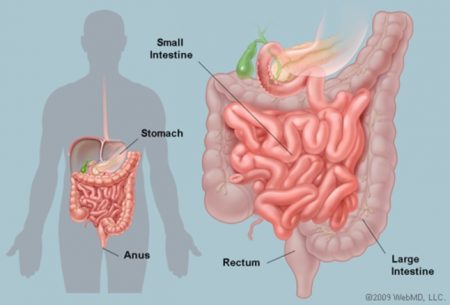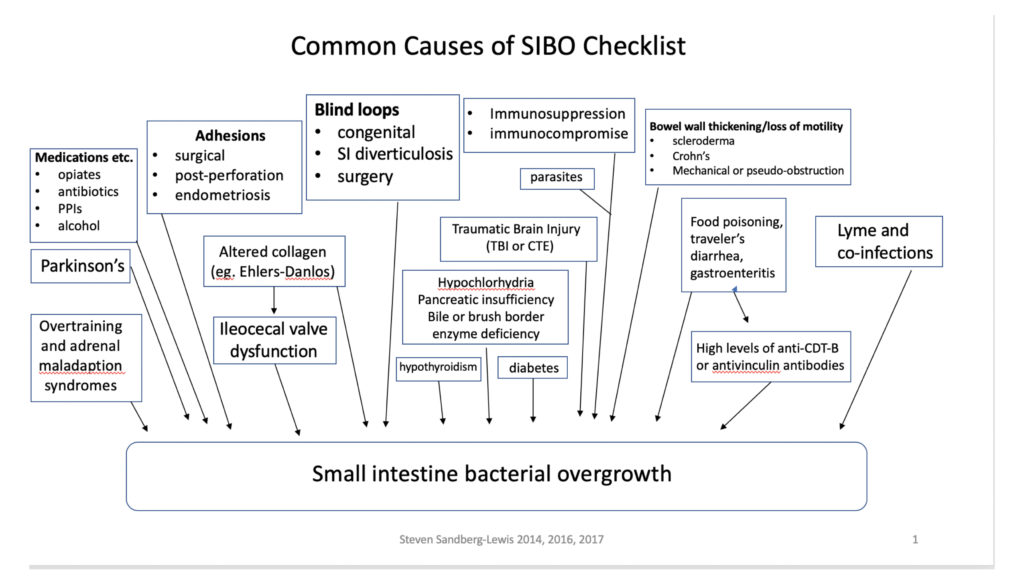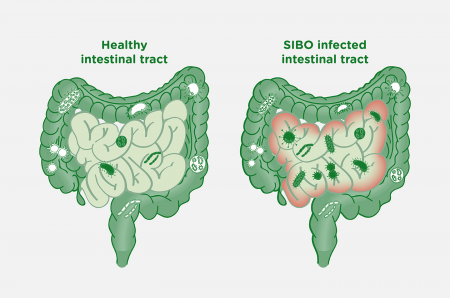SIBO stands for Small Intestinal Bacterial Overgrowth, and is one of the most common causes of digestive upset that I see in my practice.
SIBO Symptoms include 1,2 :
- Bloating and abdominal discomfort (often to extreme degrees and after most meals)
- Gas – flatulence and burping
- Constipation or loose stools (previous diagnosis of IBS C (constipation) or D (diarrhea) are common)
- Malabsorption of nutrients (especially iron deficiency that is hard to improve )
- Fatigue and Brain Fog
- Heartburn
- Nausea
- Fullness after meals and feeling of slow digestion
- Symptoms worse with probiotics
Conditions frequently associated with SIBO include: celiac disease, IBS and IBD, anemias, leaky gut, non-alcoholic fatty liver disease, rosacea and skin inflammation, interstitial cystitis, hypothyroidism, restless leg syndrome, histamine intolerance.
What is SIBO
SIBO is an overgrowth of bacteria (or an archaea called M. smithi, which is actually being given it’s own diagnosis term but for the simplified purposes of this post we will include it in our “SIBO” label) in the small intestine.

Small and large intestines. img from webmd
So we now know that the good bacteria in our body is super important. Probiotics have wide spread benefits including improving the gut-brain connection, decreasing inflammation and improving general digestion. A healthy digestive tract improves almost every other function in our body because it helps us absorb more nutrients vital to healthy function. BUT we can have too many good bugs some times. Where we want the majority of good bugs, or balanced microbiotia we could say, is in the large intestine (or colon). When we have SIBO we have had to many bugs migrated up into the small intestine from the colon. A healthy colon houses just under a trillion bacteria (10^11 is average, 10 ^12 is a trillion) per ml . A healthy small intestine houses 10^8/ml in the lower small intestine (ileum) and about 10^3/ml in the upper small intestine (doudenum and jejunum). When we get over 10^3 bugs/ml in our upper small intestine, we can diagnosis SIBO. 3, 4
What Causes SIBO
There are many many causes to SIBO, and each person has a unique health and digestive history that we need to consider while treating SIBO and preventing relapse.

Common causes of SIBO, img by Dr. SSL
One of the most common things I see in clinic, and a major piece of many of the causes listed above, is that digestion overall moves too slow. There is something called the migrating motor complex (MMC) and it’s role is to move food from the small intestine to the large intestine. It takes the MMC about 2 hours to finish it’s job, and if we eat before it’s done (aka snacking), it doesn’t get to clear all the food out. Other things besides frequent snacking can impact our MMC, including our nervous system, serotonin levels and hormones. When our MMC doesn’t work properly we don’t get the food and bugs (good or bad) that we have ingested moved out of our system. This increase the microbe load in between our small and large intestines. Bacteria from the large intestine can then move up to the small intestine. The excess of bacteria in the small intestines proceeds to snack on the foods we eat (fibrous foods specifically) and that is what produces the SIBO symptoms. So basically SIBO is a bunch of bacteria just snacking and gassing away in your gut, cute hey!
The bacteria in SIBO feed on fibers and sugars (M. smithii, our special archaea, feeds on the bacteria that feed on the fibre).
Specific foods that SIBO bacteria LOVE (aka aggravate symptoms) are:
- Garlic and Onions
- Apples
- Fermented foods and probiotics
- High fibre raw veggies (kale and salad stuffs)
- Things on the FODMAPS list (fermentable oligo-, di-, mono-saccharides and polyols)
So What Do We Do About SIBO?
First we get tested to confirm that you have SIBO, and what kind of imbalance you have. There are 3 different kinds of microbial profiles you can have, more info here.
Once we know your SIBO results we:
- Treat the type of SIBO you have with antimicrobials. Usually 2-3 different herbal combos at a time, usually for about 2-4 weeks of treatment.
- I also look at your health and digestive history to determine what is the most likely cause of you SIBO. We support all the issues that caused SIBO in the first place. This helps prevent a relapse.
- We heal your gut through diet, lifestyle and supplements. This helps you digest more foods better, decrease overall inflammation and improves your overall health!
To talk about SIBO testing and treatment you can book an appointment with Dr. K.
Book Cranbrook Appointment Book Kimberley Appointment
Please remember that this info is info only, not medical advice.
Cheers,
Dr. Katelyn Mudry, ND, MSc
References
- https://www.europeanreview.org/wp/wp-content/uploads/030-035.pdf
- https://pubmed.ncbi.nlm.nih.gov/29915215/
- https://www.ncbi.nlm.nih.gov/pmc/articles/PMC4991899/
- https://www.ncbi.nlm.nih.gov/pmc/articles/PMC3099351/
